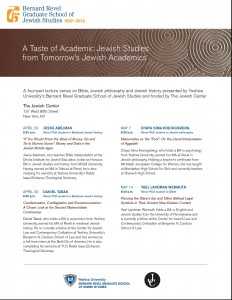Mar 29, 2012 By: admin
 Four-part Revel PhD lecture series hosted at the Jewish Center
Four-part Revel PhD lecture series hosted at the Jewish Center
A series of four lectures by Revel PhD students was hosted by the Jewish Center in Manhattan on consecutive Mondays from April 23 to May 14 this year. The series, entitled “A Taste of Academic Jewish Studies from Tomorrow’s Jewish Academics,” was the third in a three-part commemoration of Revel’s seventy-fifth anniversary. { This lecture series showcased the school’s talented young academics, who presented on the subjects of Bible, Jewish Philosophy and Jewish History. Below is a synopsis of their lectures and brief biographic information.
April 23 Jesse Abelman, Revel PhD student in Medieval Jewish history “If you would know the value of money, go and try to borrow some”: Money and Debt in the Jewish Middle Ages The tendency of the twelfth-century Western European government leaders to cancel currency for a new coinage raised a significant halakhic question: if a loan is issued in one currency, and the government cancels it for another, in which currency should the loan be repaid? In his talk, Jesse Abelman explored the ways that rabbinic authorities considered the view of the Gemara as well the mindset of the lenders to resolve this question. Jesse Abelman, who teaches Bible interpretation at The Drisha Institute, holds an Honours BA in Jewish Studies and History from McGill University. Having earned an MA in Talmud at Revel, he is also studying for semicha at the Rabbi Isaac Elchanan Theological Seminary of Yeshiva University. April 30 Daniel Tabak, Revel PhD student in Medieval Jewish History Condemnation, Conflagration, and Excommunication: A Closer Look at the Second Maimonidean Controversy In his talk, Daniel Tabak considered whether the anti-Maimunists’ knowledge of the esoteric Kabbalah fueled the Second Maimonidean Controversy of the 1230’s. Tabak examined Maimonides’ philosophy in general in comparison to the fundamentals of kabbalah. In doing so, he assessed the claim that R. Jonah, one of the chief anti-Maimunists, was a kabbalist, and questioned the kabbalah/philosophy binary by noting instances where the two seem to coincide rather than conflict. Daniel Tabak, who holds a BA in Economics from Yeshiva University, earned his MA at Revel in Medieval Jewish History. He is currently a Fellow at the Center for Jewish Law and Contemporary Civilization at the Cardozo School of Law and has worked as a full-time intern at the Beth Din of America. He is also completing his semicha at YU’s Rabbi Isaac Elchanan Theological Seminary. May 7 Chaya Sima Koenigsberg, Revel PhD student in Jewish Philosophy Maimonides vs. the “Fool”: On the Literal Interpretation of Aggadah Chaya Sima Koenigsberg, in her lecture, explored how Maimonides and his geonic predecessors responded to the challenge of scientifically implausible and theologically problematic Aggadot. Their solution—that not all aggadot are authoritative, and that not all should be read literally—is still relevant today, as educators debate the degree to which midrash aggadah should be incorporated into Day School curricula and whether midrashim should be presented as literal to students. Chaya Sima Koenigsberg, who holds a BA in Psychology from Yeshiva University, earned her MA at Revel in Jewish Philosophy. Holding a Teacher’s Certificate from Michlalah Jerusalem College for Women, she has taught at Manhattan High School for Girls and currently teaches at Shevach High School in Queens. May 14 Yael Landman Wermuth, Revel PhD student in Bible Piercing the Slave's Ear and Other Biblical Legal Symbols in Their Ancient Near Eastern Context In her talk, Yael Landman Wermuth considered the legal symbolic act and used material from the ancient Near East to help explain how Biblical symbols would have been interpreted in their times. In doing so, she evaluated the dividing of animals in making covenants (as in Genesis 15), the breaking of tablets to void a legal contract (as in Exodus 32), and the piercing of the slave’s ear (as in Exodus 21) in light of ancient Near East practices. Yael Landman Wermuth holds a BA in English and Jewish Studies from the University of Pennsylvania and is currently a fellow at the Center for Jewish Law and Contemporary Civilization at the Cardozo School of Law. Article by by Rebecca Banner
